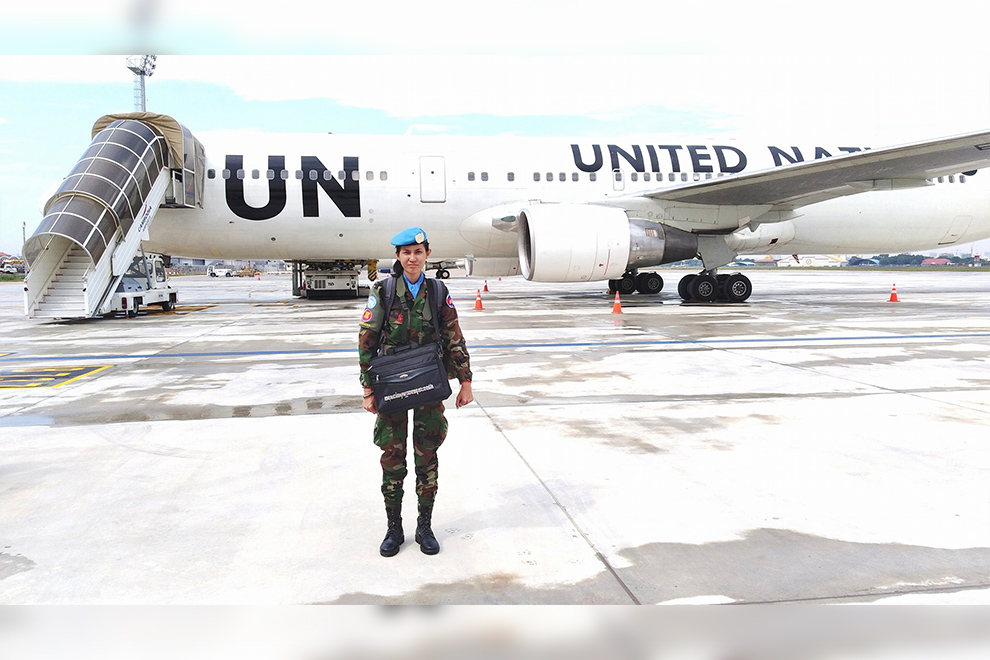
Commanding officer of Cambodian Multi-role Engineering Unit
Lieutenant Colonel Sorm Leangy broke new ground, as Cambodia’s first female unit commander deployed to the UN peacekeeping mission in Lebanon.
At just 33 years old, Leangy’s journey from a small Cambodian village to leading a contingent of 180 personnel — including 38 women — offers valuable insights into the evolving role of women in peacekeeping and military leadership.
Since 2018, Leangy has served in five UN missions across Mali and Lebanon, earning respect through her resilience and leadership in environments traditionally dominated by men.
Her story was then featured in UN Women, established in 2010 as a UN entity dedicated to promoting gender equality and empowering women worldwide.

Her appointment in 2024 as unit commander during Cambodia’s 14th rotation to Lebanon marked a milestone not only for her country but also for women in peacekeeping globally.
Her leadership approach combines empathy, patience and decisiveness — qualities that challenge stereotypes about women’s roles in military operations, according to UN Women.
“Women are fully capable of leading,” Leangy said.
“We contribute with understanding and calmness — but we’re also able to take firm action when necessary,” she added, stressing the balanced qualities women bring to high-pressure leadership roles.
Lieutenant Colonel Leangy began her military career in 2012 and graduated from the Cadet Officer School in 2016.

She enhanced her expertise through various short courses at Cambodia’s Peacekeeping Training Center, including UNLOG, UNSOC, demining and explosive ordnance disposal (EOD) training.
In 2018, she furthered her international training by completing the GPOI course in Bangladesh.
That same year, she was deployed to the United Nations Multidimensional Integrated Stabilization Mission in Mali (MINUSMA) as a food officer.
She returned to MINUSMA in 2021 as a logistics officer and rose to the position of deputy commanding officer of the Cambodian Airfield Engineering Company in 2022.

She then served in the UN Interim Force in Lebanon (UNIFIL) as the commanding officer of the Cambodian Multi-role Engineering Unit.
Leading a large, diverse team in a high-pressure conflict zone, Leangy faced the dual challenge of proving her competence and overcoming initial scepticism.
“If I didn’t succeed as a female leader, some might have used that to claim women aren’t suited for such roles,” she explained.
“That kind of failure could have discouraged others from stepping forward,” she added.

Through steady performance and clear communication, she fostered trust and respect among her troops.
“Everyone did their part and watched how I handled things. Eventually, the doubts faded — actually, they started supporting me,” she said.
Leangy’s experience also underscores the broader benefits women bring to peacekeeping.
Drawing on her own missions, she highlighted women’s ability to build strong connections with local communities, an essential factor for effective information gathering and conflict reduction.
“Women are able to form meaningful relationships with communities, help defuse tensions and take on important roles in delicate situations,” she explained.

Her leadership was part of a wider push within the Royal Cambodian Armed Forces (RCAF) and the UN to increase women’s participation in peace operations.
A barrier assessment conducted between 2022 and 2024 — supported by UN Women and the Elsie Initiative Fund — identified opportunities to strengthen gender-responsive recruitment and deployment practices in Cambodia.
These efforts have already increased the proportion of uniformed women in Cambodia’s peacekeeping contingents from 16.5 per cent in 2022 to 20 per cent in 2024.
According to UN Women, it continues to provide technical support through regional projects promoting women’s meaningful participation in peace and security across ASEAN.
“This collaboration shows that there’s a growing global acknowledgment that having women in leadership isn’t just about fairness — it also enhances the success of peacekeeping missions,” explained the organisation.

Back in Cambodia, Leangy now serves as an administrative officer at the National Centre for Peacekeeping Forces, Mine and Explosive Remnants of War Clearance (NPMEC), where she helps mentor and prepare the next generation of peacekeepers.
Her leadership earned her a Gold Medal from the RCAF, as well as a UN medal.
To young women aspiring to similar paths, she offers simple but powerful advice.
“Believe in your potential. Be brave enough to face the obstacles. And never forget — women are just as capable as men in getting the job done,” she said.
Leangy’s story demonstrates that women’s leadership in peacekeeping is not just a symbol of progress — it is a practical force for building peace and trust in conflict zones.
As UN Women notes, increasing women’s representation in peace and security roles strengthens the effectiveness and sustainability of peacekeeping operations worldwide.
“When women get involved,” Leangy concludes, “we build peace.”
Dominic Williams, British ambassador to Cambodia, wrote on his social media that he was pleased that the UK supported the UN Women Asia and the Pacific project.
Lieutenant Colonel Sorm Leangy, who served in UNIFIL as the commanding officer of the Cambodian Multi-role Engineering Unit, broke new ground as Cambodia’s first female unit commander deployed to the UN peacekeeping mission in Lebanon. Supplied










